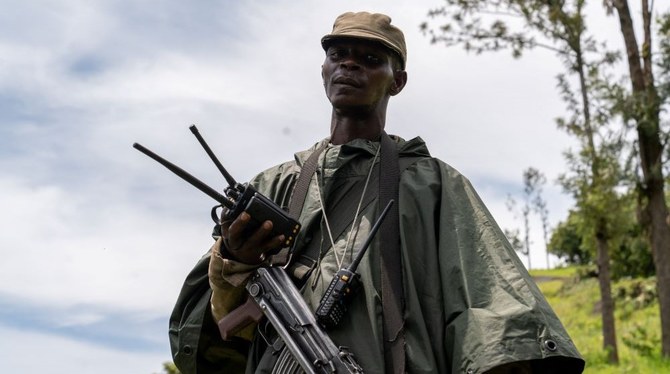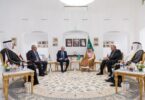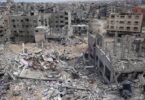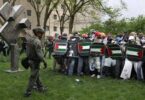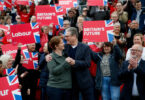Mohamed Chebaro
The number of internally displaced persons in the Democratic Republic of the Congo could be rising in the absence of real measures to address decades of violence and reprisals for political, ethnic or economic reasons. The latest figures from the International Organization for Migration warn that the recent eruption of violence has raised to 6.9 million the number of Congolese civilians displaced in the country. In the east, a Rwanda-backed militia, the March 23 Movement, has been responsible for attacks on towns and villages, leaving a weakened national army and UN troops unable to protect the innocent.
The outlook concerning the future of those displaced is grim, as more of the same is likely amid a regional void that is fueled by strains affecting multilateralism and the ability of international powers to drive a more peaceful agenda between the key players in the region. Neighboring countries have for years been orchestrating proxy wars, funding militias and shuffling the geopolitical cards to support their hegemonic interests, as well as to benefit from whatever can be squeezed out of the mineral-rich eastern Congo.
As a young journalist in the mid-1990s, I reported on the Rwanda genocide and witnessed, from Congo’s east, the great return of displaced Rwandans to their country two years after the Rwandan Patriotic Front – an army of Tutsis and moderate Hutus led by current President Paul Kagame – seized the capital and took power following the genocide that killed 800,000 Tutsis in just three months.
The image of miles-long queues of people on the march home from eastern Congo (then Zaire) to Rwanda will never leave me. I naively thought at the time that it would never be witnessed again. But developments over the last two decades point to further displacement and suffering. This is due to lingering ethnic and political tensions, but also maybe due to various countries vying for potential access to lucrative deposits of natural resources that Congo has been blessed with, but which are increasingly becoming a curse.
The departure of the Rwandan refugee population in 1996 did not end the suffering of eastern Zaire, which became Congo in 1997 after the ousting of Mobutu Sese Seko’s regime. Neighboring Rwanda, Uganda and Eritrea then supported the Congolese rebel-turned-president Laurent Kabila and his Alliance of Democratic Forces for the Liberation of Congo. But that only resulted in a regime in Kinshasa that enjoyed intermittent periods of peace and order; it was never able to impose stability on all parts of this huge country.
Congo is the biggest country in sub-Saharan Africa, rich in resources like gold, diamonds, cassiterite, cobalt and uranium. It has, over the years, seen its enormous wealth attract many foreign powers and groups, all of which have exploited the country’s weaknesses to plunder its natural resources.
Since its independence from Belgium in 1960, Zaire and later Congo has oscillated between nominal stability and chaos, as divisions and proxy conflicts have persisted, with regular confrontations between groups loyal to regional power brokers that are interested in keeping a foothold in the country at the expense of the permanently weakened central government. It is home to one of the largest peacekeeping operations in the world, which has tried to keep the peace for the last two decades, costing the international community in excess of $1 billion annually.
There has been a recent renewal in the fighting between Congolese national forces and the M23 rebel group, which is backed by the Tutsi-dominated government of Kagame in neighboring Rwanda. The latter’s claim that Kinshasa has failed to honor a peace agreement reached more than 10 years ago to disband the M23 militia and incorporate its fighters into the Congolese army is only half of the story, since the M23 has proven to have been a potent force that previously occupied Goma, the key eastern Congolese city. Aid organizations and the UN have warned against further escalations and the displacement of larger numbers of civilians within Congo’s borders, as their resources are already stretched.
Congo’s eastern neighbors, particularly Rwanda and Uganda, have a long history of military intervention inside the country. These two countries invaded parts of eastern Congo in 1996 and again in 1998, claiming they were defending themselves against local militias that were allegedly mounting cross-border attacks.
The second of those wars ended after a peace treaty was signed in 2003. But in the years since, Congo’s government, UN investigators and independent experts have accused Rwanda and Uganda of supporting militias inside Congo, including the M23. They say this support has been aimed at maintaining geopolitical influence and profiting from the extraction of the area’s mineral riches. Both countries have repeatedly denied those charges.
The number of internally displaced persons worldwide has crossed the 62 million mark, according to the UN. Most of these people were displaced as a result of conflicts in countries like Afghanistan, Syria, Ukraine and Congo. Congo’s conflict is not unique, as its civilian population finds itself trapped in perpetual cycles of violence, conflicts and dispossession, with the international rule of law rarely visiting the edges of this vast nation. Congo is likely to continue as the focus of the appetites of nonstate and state actors because of its natural resources, which are increasingly in short supply. Many observers of the country have long held the view that, where displacement is recorded in the east, mining operations are likely to spring up afterward.
In a leaderless world and amid the increasingly conflictive nature of the relationships between the key superpowers, the broken but still viable international rule of law, as represented by the work of international organizations, serves as a sticking plaster to treat gushing wounds. Unified African and international efforts are needed to deal with the symptoms. The wars in Ukraine and Gaza – and the inability of diplomacy to bring them to an end – show how polarized our world has become and how poorly observed the tenets and values of international laws are. This will only increase the number of internally and externally displaced people in Congo, Africa and beyond.

